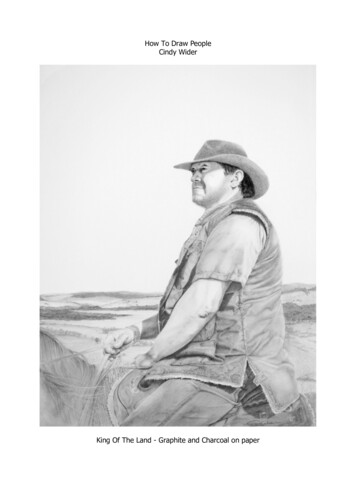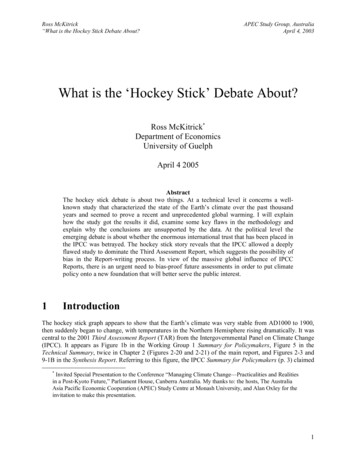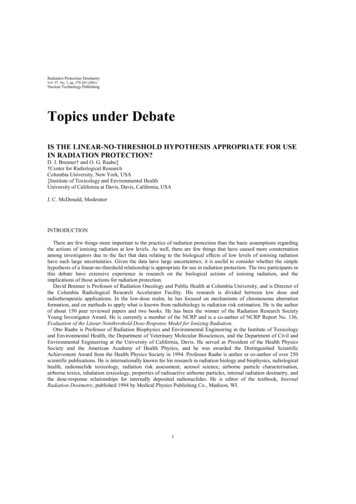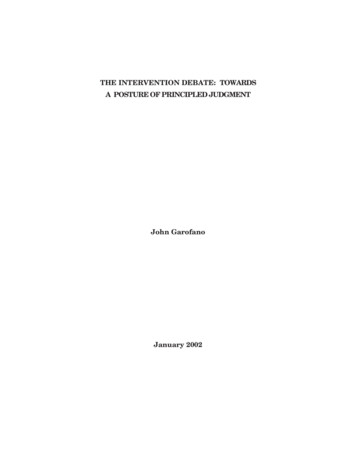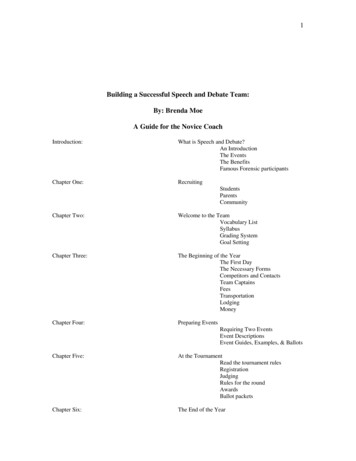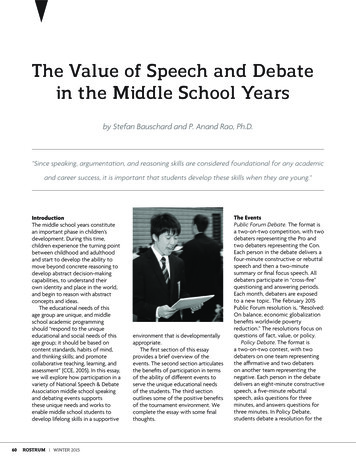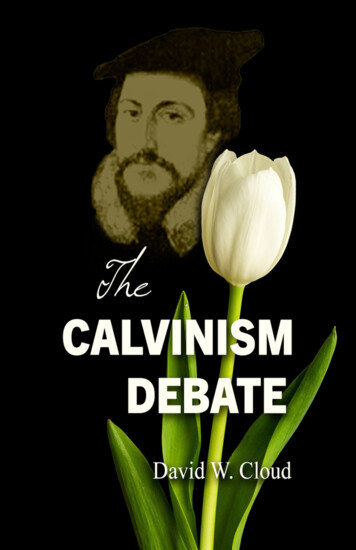
Transcription
The Calvinism DebateCopyright 2006 by David W. CloudThis edition December 2020ISBN: 1-58318-093-1Published by Way of Life LiteraturePO Box 610368, Port Huron, MI 48061866-295-4143 (toll free) - fbns@wayoflife.orgwww.wayoflife.orgCanada: Bethel Baptist Church4212 Campbell St. N., London Ont. N6P 1A6519-652-2619 (voice) - 519-652-0056 (fax)info@bethelbaptist.caPrinted in Canada byBethel Baptist Print Ministry
ContentsWhat We Believe about Salvation .5Introductory Points.9John Calvin and Process Salvation .21A Summary of TULIP Theology .25Calvinism on the March.30Central Errors of Calvinism .42Not all Calvinists the Same .76Beware of Quick Prayerism .80Calvin’s Camels .83Calvinism’s Proof Texts Examined .114What about Hyper-Calvinism? .160A Question for Non-hyper Calvinists .164Hebrews vs. Sovereign Election Theology .167Calvinist Standard Version (CSV) .171
“By predestination we mean the eternal decree ofGod, by which he determined with himself whateverhe wished to happen with regard to every man. All arenot created on equal terms, but some are preordainedto eternal life, others to eternal damnation; and,accordingly, as each has been created for one or otherof these ends, we say that he has been predestinated tolife or to death”-- John Calvin, Institutes of the Christian Religion,Book III, chapter 21
What We Believe about SalvationAll men are fallen sinners and are incapable of producingthe righteousness required by God for salvation. Mankind fellin Adam. “Wherefore, as by one man sin entered into theworld, and death by sin; and so death passed upon all men,for that all have sinned” (Ro. 5:12).Man’s awful fallen condition is described in Romans3:9-18. “As it is written, There is none righteous, no, notone: There is none that understandeth, there is none thatseeketh after God. They are all gone out of the way, they aretogether become unprofitable; there is none that doeth good,no, not one. Their throat is an open sepulchre; with theirtongues they have used deceit; the poison of asps is undertheir lips: Whose mouth is full of cursing andbitterness: Their feet are swift to shed blood: Destruction andmisery are in their ways: And the way of peace have they notknown: There is no fear of God before their eyes.”Fallen men are dead in trespasses and sins (Eph. 2:1) andby nature the children of wrath (Eph. 2:3), having no hope,and without God in the world (Eph. 2:12). “The wicked areestranged from the womb: they go astray as soon as they beborn, speaking lies” (Ps. 58:3). The heart of man is “deceitfulabove all things, and desperately wicked” (Je. 17:9). Men arecondemned already (Joh. 3:18). They abide under the wrathof God and they have no excuse for their sin and unbelief(Ro. 1:18-20).Fallen man bears the image of God (1 Co. 11:7) and has aconscience of good and evil (Ro. 2:14-15) and can do goodworks (Ac. 10:1-2), but he cannot do the works that arerequired for salvation. Everything the sinner does is taintedby sin. Even his righteousnesses, the very best he can do, areas filthy rags before God (Isa. 64:6). There is absolutelynothing man can do to save himself from his awful condition
6The Calvinism Debateunder God’s wrath. Man cannot be redeemed by any humanpayment or device (Ps. 49:7-9).God works all things after the counsel of His own will(Eph. 1:11; Ps. 135:6; Isa. 46:10-11; Da. 4:35)God will have all men to be saved, and to come unto theknowledge of the truth. For there is one God, and onemediator between God and men, the man Christ Jesus; Whogave himself a ransom for all, to be testified in due time (1 Ti.2:4-6).God is not willing that any should perish but that allshould come to repentance (2 Pe. 3:9).God so loved the world, that he gave his only begotten Son,that whosoever believeth in him should not perish, but haveeverlasting life (Joh. 3:16).Jesus Christ is the propitiation for our sins: and not forours only, but also for the sins of the whole world (1 Jo. 2:1).Salvation is a gift of God’s grace, not of works, lest any manshould boast (Eph. 2:8-9). There are no works that a man cando to save himself.Salvation is 100% by God’s grace through Christ’satonement and 0% by man’s work (Ro. 11:6; 2 Ti. 1:9; 1 Pe.1:18-21).Salvation is through faith (Ro. 3:25, 30, 31; Ga. 3:8, 14; Eph.2:8; 3:15; Heb. 6:12).Faith is not works. The Bible contrasts faith with works(Ro. 9:32; Ga. 2:16; 3:2). By the law of works there is boasting,but not by the law of faith. “Where is boasting then? It isexcluded. By what law? of works? Nay: but by the law of faith”(Ro. 3:27). Faith is like the hand that receives God’s gift ofsalvation. Receiving a gift is not a work and is nothing toboast of. All glory goes to the giver.God does the work of drawing sinners to salvation. Sinnersdon’t seek God on their own; they can’t convict or enlightenor repent themselves. They can’t bring themselves out of
What We Believe About Salvation7darkness into light. They can’t regenerate themselves. Christsaid He would draw all men to Himself. “And I, if I be liftedup from the earth, will draw all men unto me” (Joh. 12:32).The Spirit of God empowers the gospel preachers (Ac. 1:8),convicts (Joh. 16:7-11) and enlightens (Heb. 6:4) the sinner.When the sinner responds to God’s drawing work andagrees with the Spirit’s conviction and trusts Christ and callsupon Him and receives Him, as God commands him to do,God does the work of salvation. That man is redeemed (Eph.1:7), forgiven (Eph. 1:7), regenerated (Tit. 3:5), raised fromthe dead spiritually (Eph. 2:1), translated into Christ’skingdom (Col. 1:13).As many as receive Christ by believing on his name aregiven power to become the sons of God, which were born,not of blood, nor of the will of the flesh, nor of the will ofman, but of God (Joh. 1:12-13). Since this passage says mencan receive Christ by believing, it is obvious that believing onChrist savingly is not “the will of man.” The sinner cannot beborn again by his will, but he can receive Christ and it isChrist who regenerates and saves him.Those who believe in Christ have eternal life (1 John5:11-13), are delivered from the power of darkness andtranslated into the kingdom of Christ (Col. 1:13), are blessedwith all spiritual blessings in heavenly places in Christ, areaccepted in the beloved, have redemption through Christ’sblood, the forgiveness of sins (Eph. 1:3-7), are quickenedtogether with Christ and made to sit together in heavenlyplaces in Christ (Eph. 2:5-7). Their lives are hid with Christ inGod (Col. 3:3). They have a hope which is a strongconsolation, an anchor of the soul, both sure and stedfast(Heb. 6:19-20), are begotten again unto a lively hope, to aninheritance incorruptible, and undefiled, and that fadeth notaway, reserved in heaven, and are kept by the power of Godthrough faith (1 Pe. 1:3-6).
8The Calvinism DebateSalvation is evidenced by a converted life. “Therefore if anyman be in Christ, he is a new creature: old things are passedaway; behold, all things are become new” (2 Co. 5:17). “Hethat saith, I know him, and keepeth not his commandments,is a liar, and the truth is not in him” (1 Jo. 2:4). Christ’s sheephear His voice and follow Him and are given eternal life andwill never perish and are safe in His hands (Joh. 10:27-30).Salvation by God’s free grace is unto good works; His graceteaches us that, denying ungodliness and worldly lusts, weshould live soberly, righteously, and godly, in this presentworld (Eph. 2:10; Tit. 2:11-14).
Introductory Points“Calvinism” is founded on the theology of John Calvin.John Calvin (1509-1564) was a French pastor and reformerin Geneva during the beginning of the ProtestantReformation. His most influential writing is the Institutes ofthe Christian Religion.He left the Roman Catholic Church in about 1530 and fledfrom France to Switzerland, where he published the firstedition of his Institutes in 1536. In 1541, he led in theformation of a church state in Geneva. In theory, Calvinbelieved in the separation of church and state, but in practicethey operated as one. All citizens were required to baptizetheir children upon pain of persecution, and every baptizedperson was a member of the “church.” Discipline was metedout by a church council working together with the citycouncil. Musical instruments were banned. Calvin wasfollowed by Theodore Beza as head of the church at Geneva.Beginning in 1555, Calvin sheltered Protestant exiles fromEngland who had fled persecution under the Roman CatholicQueen Mary. They formed a church led by John Knox andWilliam Whittingham. The latter was the head of thecommittee that produced the Geneva Bible (1560).At Geneva, Calvin published a psalter (with psalms byClement Marot, Calvin, Louis Bourgeois, and others). Thisincluded the long meter called the “Old 100th” by Bourgeois.(It is the tune for “Praise God from Whom All BlessingsFlow.”) Calvin founded a school with two parts: a grammarschool called the college and an advanced school called theacademie. It was first headed by Theodore Beza. Eventually,the college became the College Calvin, and the academiebecame the University of Geneva.
10The Calvinism DebateCalvin’s theology became the cornerstone of Presbyterianand Reformed theology and spread widely among Baptistchurches in England and America. It is the basis of the DutchReformed Church (the Heidelberg Catechism and BelgicConfession), the Hungarian Reformed Church (SecondHelvetic Confession), Scottish Presbyterianism, and EnglishPresbyterianism. The Westminster Confession of 1646, whichwas drawn up by Puritans in England, is a Calvinist statementof faith. It was adopted by Congregationalists (the SavoyDeclaration of 1658) and by Particular Baptists (the SecondLondon Baptist Confession of 1689).Calvin’s fundamental doctrine is “sovereign election,” alsocalled “sovereign grace.” He readily acknowledgeddependence upon the theology of Augustine, one of the four“doctors” of the Catholic Church. Calvin summarized hisdoctrine of election as follows:“By predestination we mean the eternal decree of God,by which he determined with himself whatever hewished to happen with regard to every man. All are notcreated on equal terms, but some are preordained toeternal life, others to eternal damnation; and,accordingly, as each has been created for one or other ofthese ends, we say that he has been predestinated to lifeor to death” (Calvin, Institutes of the Christian Religion,Book III, chapter 21).There are many types of Calvinism today, but sovereignelection is the fundamental of them all.I have studied Calvinism from “the horse’s mouth.”In order to gain a proper understanding of Calvinism, Ihave studied the writings of many influential Calvinists, bothcontemporary and past. I have examined Calvinism manytimes during the 47 years since I was saved. The first time wasshortly after I was converted, when I was in Bible College,and Calvinism was one of the many topics that werestrenuously discussed by the students. I had never heard of
Introductory Points11Calvinism before that and I didn’t know what to think of it, soI read Arthur Pink’s The Sovereignty of God and a couple ofother titles on the subject with a desire to understand it andto know whether it was scriptural or not. Some of thestudents became Calvinists, but I concluded that thoughCalvinism makes some good points about the sovereignty ofGod and though I personally like the way it exalts God aboveman and though I agree with its teaching that salvation is100% of God and though I despise and reject the shallow,manipulative, man-centered soul winning scheme that is socommon among fundamental Baptists and though Calvinismdoes seem to be supported by a few Scriptures, the bottomline to me is that it ends up contradicting far too many plainScriptures. In brief, it is contrary to the entire tenor ofScripture.In the year 2000 I was invited to preach at a conference onCalvinism at Heritage Baptist University in Greenwood,Indiana, which was subsequently held in April 2001. Theconference was opposed to Calvinism; and I agreed to speak.Before I put together a message for the conference, I wantedto re-examine Calvinism in a more thorough manner. Icontacted Dr. Peter Masters in London, England, anddiscussed the subject of Calvinism with him. I told him that Ilove and respect him in Christ and I also love and respect hispredecessor, Charles Spurgeon, though I do not agree witheither of them on Calvinism (or on some other issues, infact). I asked Dr. Masters what books he would recommendso that I could understand what he believes on the subject(knowing that there are many varieties of Calvinism). Amongother things, Dr. Masters recommended that I read Calvin’sInstitutes of the Christian Religion and Iain Murray’s Spurgeonvs. the Hyper-Calvinists, which I did.In the last few years I have re-investigated Calvinism fromboth sides. I read Dave Hunt’s What Love Is This? and ACalvinist’s Honest Doubts Resolved by Reason and God’s
12The Calvinism DebateAmazing Grace. I read Debating Calvinism: Five Points, TwoViews by Dave Hunt and James White. I re-read Arthur Pink’sThe Sovereignty of God and the Westminster Confession ofFaith. I read Laurence Vance’s The Other Side of Calvinismand studied about 100 pages of materials published in defenseof Calvinism by the Far Eastern Bible College in Singapore.This is a Bible Presbyterian school.As best as I know how, I have studied these materials withthe sole desire to know the truth and a willingness to followthe truth wherever it leads.Thus, I have made a considerable effort to understandCalvinism properly and not to misrepresent it (though I havelearned that a non-Calvinist will ALWAYS be charged withmisrepresentation). Further, there is a wide variety ofCalvinism.Baptists must face the issue of Calvinism.Calvinism is a divisive subject, but it must be faced becauseit touches some of the most important points of biblical truthand affects how Christians perceive the gospel and the veryperson of God.There have always been divisions among Baptists on theissue of Calvinism. The early Baptists in England weredivided into the General Baptists and the Particular Baptists,referring to how they viewed Christ’s atonement, as towhether it was for all men (general) or only for the elect(particular). Adam Taylor’s History of the General Baptists ofEngland (1818) deals with the history of the non-CalvinistBaptists in Great Britain, and there were a large number ofthem. To my knowledge, Taylor is the only 19th-centuryBritish Baptist historian who was not a Calvinist. It is certainthat the vast majority of Baptist histories are written byCalvinists and they typically neglect, and sometimesmisrepresent, the history and beliefs of non-CalvinistBaptists.
Introductory Points13Be that as it may, the fact remains that Baptists have alwaysbeen divided on this issue and it is not wise to draw backfrom dealing with it today, even though divisions arecertainly the result.Calvinism has hindered biblical evangelism.Calvinism almost killed the evangelistic zeal of the Baptistchurches of England in the 18th century and well into the19th. Among Calvinists, evangelism is done in spite ofCalvinism, not because of it. Baptist historian ThomasArmitage wrote: “William Carey’s ‘Inquiry into theObligations of Christians to use means for the Conversion ofthe Heathen’ was published in 1792, but found few readersand produced little effect. To most of the Baptists his viewswere visionary and even wild, in open conflict with God’ssovereignty. At a meeting of ministers, where the seniorRyland presided, Carey proposed that at the next meetingthey discuss the duty of attempting to spread the Gospelamongst the heathen. Ryland, shocked, sprang to his feetand ordered Carey to sit down, saying: ‘When God pleases toconvert the heathen, he will do it without your aid or mine!’”Things were not much better when Spurgeon took his firstpastorate in 1854. This situation is described in Spurgeon vs.the Hyper Calvinists by Iain Murray. Many Calvinists opposedSpurgeon and denounced his broad, indiscriminateinvitations for sinners to come to Christ. For example, oneCalvinist publication warned that “to preach that it is man’sduty to believe savingly in Christ is ABSURD” (EarthenVessel, 1857).Calvinism is an unsettled theology.Calvinists are seriously divided among themselves andalways have been. There is Supralapsarianism vs.Sublapsarianism vs. Infralapsarianism. “The Supralapsarianshold that God decreed the fall of Adam; the Sublapsarians,that he permitted it” (McClintock & Strong). The Calvinists at
14The Calvinism Debatethe Synod of Dort were divided on many issues. The SwissCalvinists who wrote the Helvetic Consensus Formula in1675 were in conflict with the French Calvinists of the Schoolof Saumur. There are Strict Calvinists and ModerateCalvinists, Hyper and non-Hyper Calvinists (differingespecially on reprobation and the extent of the atonementand whether God loves all men), 5 pointers, 4 pointers, 3pointers, and 2 pointers. In America, Calvinists were dividedinto Old School and New School.Whenever, therefore, one tries to state TULIP theology andrefute it, there are Calvinists who will claim that you aremisrepresenting Calvinism. You might be quoting directlyfrom various Calvinists or even from Calvin himself. Theproblem is that you are misrepresenting THEIR Calvinism!There are Calvin Calvinists and Andrew Fuller Calvinists andArthur Pink Calvinists and Presbyterian Calvinists andBaptist Calvinists and other sorts of Calvinists. ManyCalvinists have never read Calvin’s Institutes of ChristianReligion for themselves. They are merely following someonewho follows someone who allegedly follows Calvin (who, byhis own admission, followed Augustine).Calvinists believe that they have the right to reject ormodify some parts of Calvin’s teaching. I agree with them100% on this, and I say, further, that we also have the right toreject the entire system if we are convinced that it is notsupported by Scripture!It is not wise to follow John Calvin; he was unsound atthe very foundation of the Christian faith.Calvin never gave a personal testimony of the new birth;rather he identified with his Catholic infant baptism. Note thefollowing quotes from his Institutes:“At whatever time we are baptized, we are washed andpurified once for the whole of life” (Institutes, IV).
Introductory Points15“By baptism we are ingrafted into the body of Christ .infants are to be baptized . children of Christians, asthey are immediately on their birth received by God asheirs of the covenant, are also to be admitted tobaptism” (Institutes, IV).(See also the chapter “John Calvin and Process Theology.”)Calvin was vicious toward his enemies, acting more like adevouring wolf than a harmless sheep.Historian William Jones observed that “that most hatefulfeature of popery adhered to Calvin through life, the spirit ofpersecution.”In Calvin: A Biography, Bernard Cottret documents morethan 36 executions in which Calvin was directly or indirectlyinvolved. He supported severe imprisonments and horribletortures.Calvin hated the Anabaptists, though they were muchcloser to the Scriptural pattern of the New Testament churchthan he was. He called them “henchmen of Satan.” Four menwho disagreed with Calvin on who should be admitted to theLord’s Supper were beheaded, quartered, and their body partshung in strategic locations in Geneva as a warning to others.The following is from Calvinism: None Dare Call It Heresyby Bob Kirkland:“Jacques Gruet, a known opponent of Calvin, wasarrested and tortured twice a day for a month in aneffort to get him to confess to the accusations againsthim. Then, on July 26, 1547, he was tied to a stake, hisfeet were nailed to it, and he was beheaded. (See alsoPreserved Smith, The Age of the Reformation, 1920, p.120.)“Gruet’s book was later found and burned along with hishouse while his wife was thrown out into the street towatch. This was not unusual behavior to those whodared to challenge or disagree with Calvin: ‘Gruet wasput to the torture many times (444) during many days
16The Calvinism Debate In reality such unmeasured use of torture was inGeneva a Calvinistic innovation. Gruet, refusing underthe worst stress of torture to incriminate anyone else, atlength, in order to end it, pleaded guilty to the chargesagainst him, praying in his last extremity for a speedydeath. On July 26, 1547, his half-dead body wasbeheaded on the scaffold, the torso being tied and thefeet nailed thereto. Such were the judicial methods andmercies of a reformed Christianity, guided by a chiefreformer’ (J.M. Robertson, A Short History ofFreethought, Ancient and Modern, 1914, Vol. 1, p. 352).“Michael Servetus, a scientist, a physician, andtheologian was born in Villanova in 1511. He angeredCalvin by returning a copy of Calvin’s writings withcritical comments in the margins. Calvin drew up adoctrine of over thirty official charges against Servetus,one of which was the rejection of John Calvin’s teachingconcerning infant baptism leading to salvation. Fivedays into the trial, Calvin wrote, ‘I hope the deathsentence will at least be passed upon him’ (The RidpathLibrary of Universal Literature, Vol. 5, p. 89). He alsostated regarding Servetus, ‘If he come, and my influencecan avail, I shall not suffer him to departalive’ (Robertson, A Short History of Freethought, 1914,Vol. 1, p. 354).“Calvin got his wish on October 27, 1553. Servetus wasburned at the stake. He was screaming as he was literallybaked alive from the feet upward and suffered the heatof the flames for thirty minutes before finallysuccumbing to one of the most painful and brutalmethods of death possible. Servetus had written atheology book, a copy of which was strapped to thechest of Servetus. The flames from the burning bookrose against his face as he screamed in agony (WillDurant, The Story of Civilization: The Reformation, Vol.VI, pp. 482-484).
Introductory Points“While Michael Servetus definitely had some unbiblicalteachings, such as his rejection of the Trinity, he was, asthe late apologist Dave Hunt puts it, ‘right about somethings: that God does not predestine souls to hell andthat God is love’ (What Love Is This? p. 79).“Some have tried to say that Calvin was not responsiblefor the cruel manner in which Servetus was executedand that all he wanted was for Servetus to be beheaded(obviously, a less painful way to be executed). BrendaNickel, a former Calvinist who was featured in adocumentary film about Reformed Theology, providessome insight:“‘Calvin had a long-standing vendetta against Servetus.Servetus foolishly taunted Calvin through letters; thus,Calvin insisted on having him arrested and chargedwhen he entered Geneva. Calvin wanted the deathpenalty for him. Servetus pleaded with Calvin to bebeheaded instead of being burned at the stake, andCalvin was willing to go along with the idea. If Servetuswas beheaded instead of burned, then Calvin couldn’tbe blamed. Beheading, in this case, was attractive toboth Servetus and Calvin. Beheading would be seen as acivil crime and free Calvin from having blood on hishands. French reformer William Farel rebuked Calvinfor the thought. Since the charge was religious and notcivil in nature, Servetus was burned at the stake.Melanchthon (Luther’s friend and successor) praisedCalvin for Servetus’ death. This execution basicallyskyrocketed Calvin to fame throughout Europe. It puthim on the map, so to speak, as a noteworthy andrespected reformer’ (Brenda Nickel, Wide Is the Gate,Vol. 2, Caryl Productions, available through LighthouseTrails or The Berean Call).“Bernard Cottret also wrote of the persecution of theAnabaptist Belot:17
18The Calvinism Debate“‘While he shared the prejudices of his contemporariesagainst sorcerers, Calvin the churchman remaineddevoted to one of the church’s principal missions, thedenunciation of heresy and the condemnation ofheretics. For Calvin the greatest heretics were theAnabaptists. They were the internal enemy, as againstthe papists, who threatened the development of the“true faith” from outside. Papists, moreover, were notheretics in the strict sense; their errors were predictable,almost programmed, and less dangerous on the wholethan those original thoughts that risked affecting theReformed world itself. In 1545 the Anabaptist Belotheld that the Old Testament was abolished by the New.This point of view might be debatable theologically, butdid it justify the torture inflicted on poor Belot after hewas chained and his invectives against Calvin werelaughed at?’ (Bernard Cottret, Calvin: A Biography, p.208).“Gruet, Servetus, and Belot were not the only ones to bepersecuted for speaking against John Calvin and hisInstitutes:“‘With dictatorial control over the populace (‘he ruledas few sovereigns have done’), Calvin imposed his brandof Christianity upon the citizenry with floggings,imprisonments, banishments, and burnings at the stake.Calvin has been called ‘the Protestant Pope’ and ‘theGenevese dictator’ who ‘would tolerate in Geneva theopinions of only one person, his own’ (Hunt, What LoveIs This?, p. 74)“It puzzles me immensely why anyone would think thatGod would use such a man as Calvin to be a great leaderof Christianity? In 1 Corinthians 11:1, Paul said, ‘Be yefollowers of me, even as I also am of Christ.’ Was JohnCalvin an imitator of Christ in his actions? I see noanswer to that question but a resounding, ‘Not at all!’”
Introductory Points19The previous paragraphs are from Calvinism: None DareCall It Heresy by Bob Kirkland.God does not require his people to choose betweenCalvinism and Arminianism!I am convinced that John Calvin has caused great andunnecessary divisions among God’s people by dogmatizinghis philosophy of God’s sovereignty and election. If men wereleft simply to believe the Bible’s own statements on thesematters, and if men were not forced to decide between theman-made theologies called “Calvinism” and “Arminianism,”the Christian world would be much better off and manyartificial and unnecessary divisions would not have resulted.The Bible says “prove all things; hold fast that which isgood” (1 Th. 5:21). The Bible itself is the test of truth, notsome man’s systematic theology. I have the right andresponsibility to test every theology by the Bible, and I amfree before the Lord to reject any part of that theology or allof it. I do not have to make a choice between humantheologies. I can stand strictly and exclusively upon the Bibleitself, the SOLE authority for faith and practice. ManyCalvinists won’t allow that, though. James White, author ofThe Truth about the King James Bible Controversy, The Potter’sFreedom, and other books, wrote to me in about the year 1999and challenged me to a public debate. He urged me to “defendArminianism.” That is a strange notion, because I don’t followArminianism and I don’t care anything about Arminianism. Ihave studied the theology of James Arminius some and I finderrors in it just as I have found errors in John Calvin’stheology. Though I do believe that Arminius was closer to thetruth than Calvin, this does not mean that I have anyintention to “defend Arminianism.” White has the idea that isso typical among Calvinists that if a man is not a Calvinist, heis surely an Arminian.This idea actually began with Calvin. He treated those whodisagreed with his position on election as enemies of God
20The Calvinism Debateand enemies of the gospel and would not admit that men canreject Calvinism and still believe God’s Word! From the timethat I was saved by God’s marvelous and free grace 47 yearsago until this very day, I have wanted to understand the willof, and to be a faithful servant of, Jesus Christ through God’spreserved Word, the Scriptures. As best as I know how, I havemade that my sole authority. I enjoy systematic theology; Ihave taught courses in Bible doctrine and have publishedbooks on Bible theology, but I test all theologies with theScripture alone, and I have never agreed completely with anyman’s systematic theology.I praise God that I am not under divine obligation tofollow either Calvinism or Arminianism. It smacks ofCorinthian carnality: “For while one saith, I am of Calvin;and another, I am of Arminius; are ye not carnal?”Calvinism is built on proof texts rather than on thewhole tenor of scripture.If isolated and interpreted through Calvinistic lenses, thereare verses that seem to teach TULIP theology, but whenScripture is taken as a whole the system crumbles.
John Calvin and Process SalvationRecently I asked a well-known Baptist historian, “DidCalvin ever renounce the baptismal regeneration teaching ofhis own infant baptism?”His reply follows.Biblical salvation is not a process. Though a process ofhearing the gospel, conviction, and spiritualenlightenment precedes it, salvation itself is a birth (Joh.3:3). It is a conversion (Mt. 18:3). It is to be made alivefrom spiritual death (Eph. 2:1). It is to be delivered fromthe power of darkness and translated into the kingdomof Christ (Col. 1:13). No other type of salvation isdescribed in the book of Acts. We think of the 3,000 onthe day of Pentecost, the Ethiopian eunuch, Saul,Cornelius, Lydia, and the Philippian jailer.The answer to your question (“Did Calvin everrenounce baptismal regeneration”) is “No.”In his Gallican Confession (1559), John Calvin asserts,“We condemn the papal assemblies. . Neverth
committee that produced the Geneva Bible (1560). At Geneva, Calvin published a psalter (with psalms by Clement Marot, Calvin, Louis Bourgeois, and others). !is included the long meter called the “Old 100th” by Bourgeois. (It is
